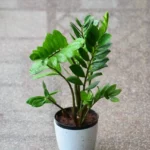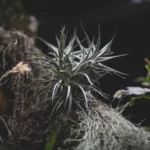The ZZ plant is one of the popular choices for houseplants if you’re looking to add a touch of nature to your home.
But could this plant put your cat in danger when ingested? ZZ plant is mildly poisonous to both pets (cats included) and humans. Contact with the plant may cause eye and skin irritation.
Most people overlook the risks associated with the ZZ plant with respect to cats. You can safely grow this plant without worrying about its toxicity.
Throughout this article, we’ll cover everything you should know about the toxicity of ZZ plants to cats.
Read more: ZZ Plant Propagation
Table of Contents
Toxicity
Since it is mildly toxic, the ZZ plant functions more like an irritant instead of a poison. The chances of your cat getting poisoned by this houseplant are rare.
Like other plants in the Araceae family, the ZZ plant have a toxic compound known as calcium oxalate. This compound offers the plant protection against predators and regulates calcium levels in the tissues.
Calcium oxalate exists in the ZZ plant in the form of small and sharp crystals. When you get into contact or consume the sap, these crystals cause burning sensations.
As a plant that grew in the wild, the ZZ plant evolved to have these crystals for protection.
What Happens if Your Cat Gets into Contact with a ZZ plant?
Just like humans, the sap from the ZZ plant causes temporary discomfort and irritation when your cat gets exposed to it. The sap mainly irritates the eyes, mucus membranes, and bare skin of your cat.
If your pet tries to eat it, the calcium oxalate crystals will inflict oral pain. As a result, your pet will quickly spit it out to avoid further pain or discomfort.
Your cat is likely to exhibit symptoms such as vomiting, diarrhea, and drooling when it consumes the sap of this houseplant.
Other symptoms include pawing at the mouth, decreased appetite, swelling of the upper airways (very rare), and oral pain.
Most of these symptoms start manifesting at least two hours after your pet consumes the ZZ plant.
Spare a few minutes to identify the specific plant that your cat ingested. You should then seek urgent veterinary help once you spot these symptoms on your beloved pet.
Remember to carry a sample of the toxic plant with you when visiting the clinic. You can also bring a sample of your cat’s vomit or poop that contains the plant material.
Read more: ZZ Plant Yellow Leaves – Causes & Solutions
How to Get Your Cat to Stop Eating Your ZZ plant
Cats love to explore and jump, which makes it challenging to keep toxic houseplants from their reach. It’s advisable to learn the names of all houseplants in your home and their toxicity levels.
With this information, you can separate the plants that are poisonous to cats from those that are safe. Furthermore, if your cat ingests a poisonous or toxic plant, knowing the houseplant’s name will make it easier for the vet to treat the animal.
Since cats are extremely sensitive to scents, you can make your houseplants smell unappetizing. You can sprinkle citrus juice onto the leaves or throw a lemon peel into the soil to keep them away. Sprinkling ground cayenne pepper around the plant will also do the trick.
Cats hate the smell or taste of plants such as roses, cactus, and Rosemary. They also hate thorny plants since they are prickly. You can plant them indoors to keep your cats from messing with them.
Keeping your houseplants in places your cat can’t reach can work. You may hand them in organic baskets from your home’s ceiling or place them in sunrooms, bathrooms, or sunny bedrooms.
Mixing one part of vinegar liquid with three parts of water and spraying the solution to your houseplants will keep cats from eating them.
Read more: How to Choose the Best Soil for Your ZZ Plant
FAQs
Will A ZZ Plant Kill A Cat?
Though ZZ plants are toxic to cats, they are unlikely to cause significant harm or death when consumed. There are no known cases of cats that died due to ZZ plant poisoning.
Your cat will only experience mild symptoms such as oral pain, diarrhea, and vomiting. Its coat may also feel itchy since the sap of this houseplant irritates when touched.
Are ZZ Plants Cat Friendly?
Since ZZ plants aren’t cat-friendly, it’s advisable to keep them out of your cat’s reach. The plant is also not friendly to toddlers.
It may help if you choose houseplants that are generally nontoxic to both your cats and family members.
The goal here is to find a plant that will add texture and color to your home while keeping your cat safe.
Read more: Zz Plant Watering – Full Guide
Which Plants Can Kill Cats?
Plants that are likely to alter or damage the function of your cat’s organs (such as the heart and kidney) include amaryllis, azaleas, and rhododendrons.
Others include autumn crocus, castor bean, cyclamen, daisy, daffodils, English Ivy, and hyacinth.
Keep your cat away from plants such as yew, tulip, Spanish Thyme, Sago palm, peace lily, kalanchoe, Devil’s Ivy, and oleander.
How Toxic Is A ZZ Plant?
The ZZ plant falls in the Araceae family, which comprises several poisonous plants. Its sap and leaves are toxic to both pets and humans.
Once you or your pet get in contact with the plant’s sap, you may suffer minor skin irritation. The ZZ plant produces calcium oxalate, which takes a crystal-like structure with very sharp edges. This compound irritates the body organs.
Can Plants Kill Cats?
Though most plants are generally safe for cats, they may cause diarrhea and vomiting. If your cat exhibits abnormal symptoms after consuming a plant, call the animal poison control center or your veterinarian for life-saving help.
Cats are mostly attracted to the spider plant, which puts them at risk of vomiting when consumed. Furthermore, it’s uncommon for a cat to ingest large amounts of a plant.
Read more: Best Soil for ZZ Plant: Everything You Need to Know
Will My Cat Eat My Plants?
If your cat develops an abnormal eating habit, talk to your veterinarian for help. The cat may opt to ingest plants because its diet lacks some essential food nutrients. This behavior may also suggest that the pet has gastrointestinal issues.
Though cats may be curious about your houseplants, it’s rare to find them ingesting the plants since they are carnivorous by nature.
Photo by Sarah Dorweiler on Unsplash



